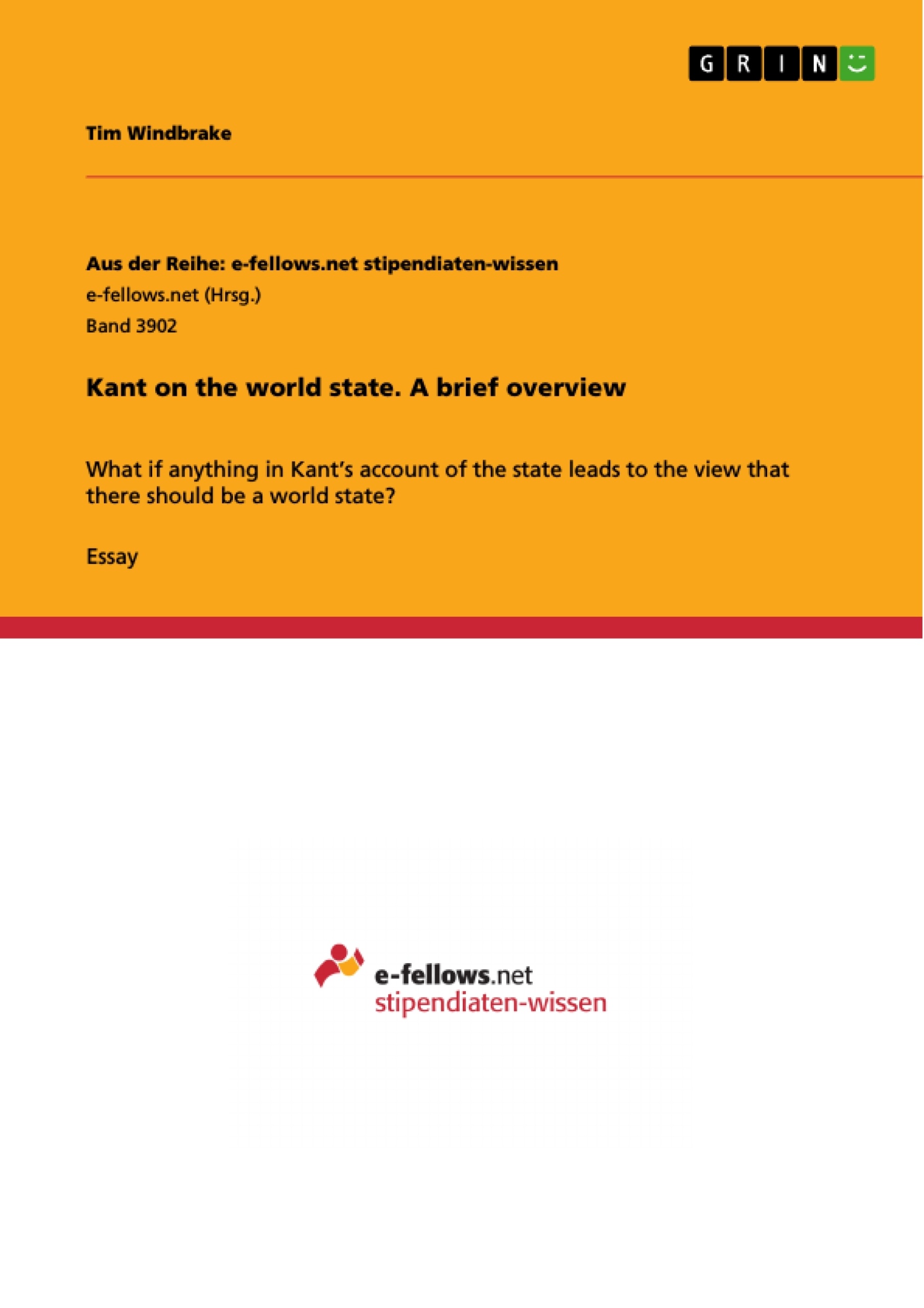This essay argues that nothing in Kant’s account speaks for the actual creation of a world state. This is because realizability seems to be necessary for Kant when arguing for the best account of state. While he is convinced that a coercive world state would be the ideal form of state to secure perpetual peace, he argues that a world state is unrealizable, which is the reason why he instead advocates an expanding voluntary league of nations. He argues that the voluntary league of nations is the best realizable alternative to a world state. This paper examines the internal consistency of Kant’s argument to judge whether he is right in advocating a voluntary league while holding the world state as the ideal in theory.
Inhaltsverzeichnis (Table of Contents)
- The 'state of nature' analogy
- A world state is indeed unrealizable
- Kant's argument for the voluntary league of nations
Zielsetzung und Themenschwerpunkte (Objectives and Key Themes)
This essay aims to examine Kant's argument for a world state as the ideal form of state to secure perpetual peace. It investigates whether Kant's account leads to the actual creation of a world state and explores the internal consistency of his argument for a voluntary league of nations as the best realizable alternative.
- Kant's "state of nature" analogy and its application to international relations
- The realizability of a world state and its implications for state sovereignty
- The concept of a voluntary league of nations as a realizable alternative to a world state
- The role of domestic and international sovereignty in establishing perpetual peace
- The relationship between reason, peace, and the formation of international agreements
Zusammenfassung der Kapitel (Chapter Summaries)
- The 'state of nature' analogy: This section examines Kant's analogy between the state of nature and the relationship between states. It argues that the analogy fails because states, unlike individuals, are already juridically sovereign, making coercion under a world state illegitimate.
- A world state is indeed unrealizable: This chapter addresses the critique that a world state is realizable, arguing that a coercive world state cannot be reconciled with states' domestic sovereignties. It explores the concept of domestic and international sovereignty and concludes that the two domains are interdependent, making a coercive world state unrealizable.
- Kant's argument for the voluntary league of nations: This section examines Kant's argument for a voluntary league of nations as the best realizable alternative to a world state. It analyzes the premises of Kant's argument, emphasizing the need for a realizable and non-coercive general agreement between states.
Schlüsselwörter (Keywords)
The main keywords and focus topics of this text include Kant's philosophy of peace, perpetual peace, state of nature, world state, voluntary league of nations, international relations, sovereignty, juridical sovereignty, domestic sovereignty, international sovereignty, realizability, coercion, and reason.
Frequently Asked Questions
Did Immanuel Kant support the creation of a world state?
While Kant saw a coercive world state as a theoretical ideal for perpetual peace, he argued that it is practically unrealizable and therefore advocated for a voluntary league of nations instead.
What is Kant's "state of nature" analogy in international relations?
Kant compared the lawless state of nature between individuals to the relationship between sovereign states, suggesting that states must enter a legal framework to achieve peace.
Why is a world state considered unrealizable by Kant?
A coercive world state would conflict with the domestic sovereignty of existing states. Since states are already juridical entities, forcing them into a single state would be illegitimate.
What is the "voluntary league of nations" (Föderalismus)?
It is an expanding federation of free, sovereign states that agree to end wars without being subject to a common coercive power.
How does sovereignty affect the possibility of a world state?
The essay argues that domestic and international sovereignty are interdependent; a world state would abolish the domestic sovereignty that Kant seeks to protect.
- Quote paper
- Tim Windbrake (Author), 2021, Kant on the world state. A brief overview, Munich, GRIN Verlag, https://www.grin.com/document/1128124



